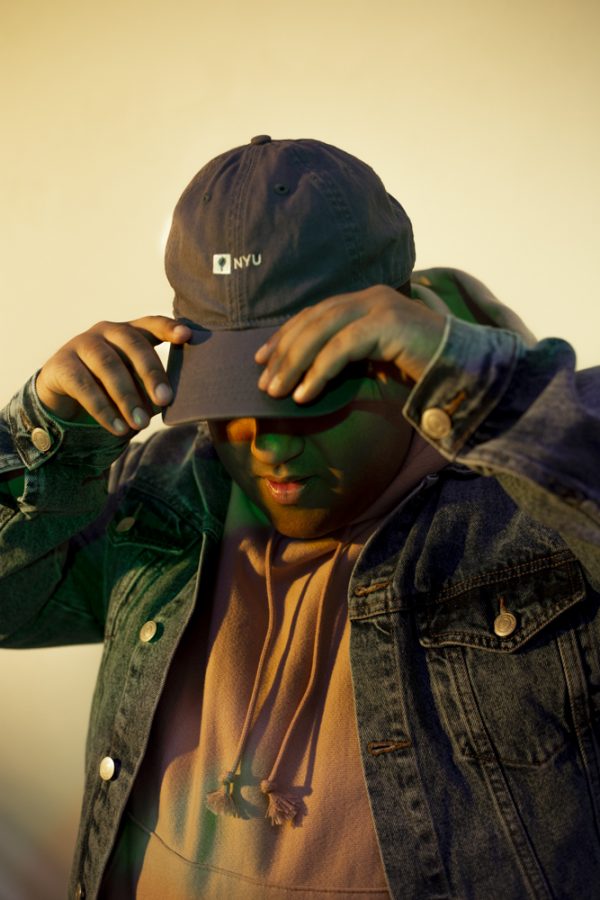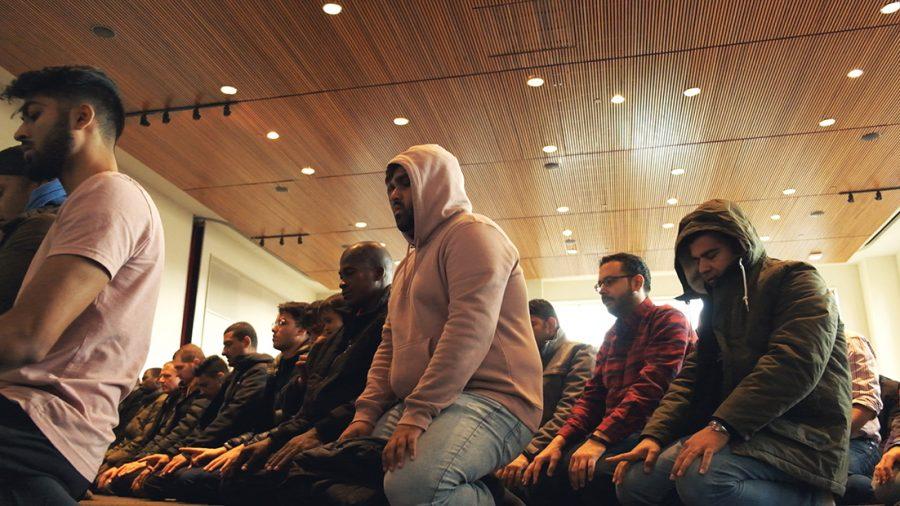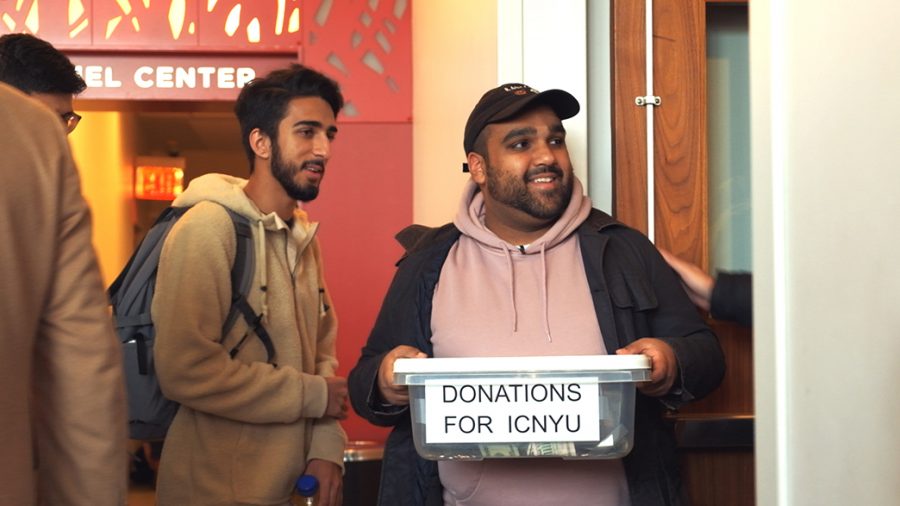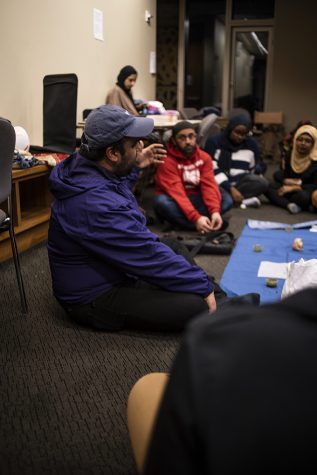
It was Nov. 9, 2016, and the Muslim community at NYU was in a frenzy. Businessman and TV personality Donald Trump had just been elected 45th president of the United States, and someone had spray painted his name onto the door of a prayer room at the Tandon campus.
The Muslim Students Association, then led by President Afraz Khan, wasted no time in responding. The leadership team, along with Islamic Center Chaplain Khalid Latif, organized a massive rally on the steps of the Kimmel Center for University Life. Hundreds attended; the main staircase and lounges were completely packed.
Khan was up in the early hours of that morning, toiling over the speech he was about to make. Looking over his shoulder was a sophomore: Omer Malik.
—
Seven years earlier, on the eighth anniversary of 9/11, Omer was an eighth-grader on Long Island, New York. Standing tall, he recited the Pledge of Allegiance along with the other 20 students in his class. But when the time came for a moment of silence to honor those killed in the attacks, all eyes turned to him. Some of his classmates snickered, others looked on with mock-disdain.
It was just another day as the only Muslim at school.
“It started in middle school, the racist jokes,” said Omer, a CAS senior and current president of the Muslim Students Association. “There were a lot of people who called me a terrorist. I had to do a lot of explaining, like ‘no, my religion means peace.’ I’m always happy to explain, but at a certain point, it just gets exhausting. It just didn’t feel like people were willing to listen.”

Shy and quiet, Omer has always been a peacekeeper. When his faith or his race became the butt of a joke, he turned the other cheek.
“Now I realize it was racist, but in those moments I would just take it,” he said. “I try to keep peace as much as possible. I was just trying to survive.”
Lacking a strong Muslim community outside his immediate family, Omer felt like an outsider throughout much of his childhood. But through his three older siblings, all NYU graduates, he found respite. He cites his sister, who is 10 years his senior, as one of the biggest religious influences in his childhood.
“My mom worked a lot so my sister would always take care of me,” Omer said. “She was kind of like my second mom.”
Some of his favorite childhood memories involve taking the train into the city from Long Island and exploring NYU with his sister or brothers. Walking around Washington Square Park, his head bobbing below the shoulders of students on their way class, 10-year-old Omer was the center of attention among his siblings’ friends.
“People took me out to lunch and to hang out in Washington Square Park,” he said. “Everyone was so interested in me.”
It was in these formative years that Omer got his first taste of what a large Muslim community looked like — a sharp contrast from what he was experiencing at school only 30 miles away.
“It meant everything to me,” he said.
So when he was accepted into the class of 2019, he was nothing short of thrilled. Though his reserved nature made it difficult to find his place during his first year, the roots his siblings established helped guide him. Omer found comfort in what he knew — the Islamic Center.
“When I first met him, he was sitting in the lounge on the fourth floor of [the Global Center for Academic and Spiritual Life], and he was kind of to himself and on his own,” said Khan, who graduated from CAS in 2017.

As vice president of MSA at the time, Khan felt an obligation to make everyone feel included. So he bought cupcakes and sat down with Omer. After that day, their friendship deepened. Khan went on to be MSA president the following year, and Omer dove headfirst into NYU’s Muslim community. Though not often heard, he was always there. He earned the nickname “Big O” from his friends on the fourth floor of GCASL — the place where he still spends most of his time.
“At the end of the day, I can never doubt or question Big O’s dedication,” Khan said. “That is very rare. And I don’t think people know how much he’s had to deal with internally. He has this passion that supersedes everything.”
Khan, along with the other leaders of MSA, inspired and mentored Omer through his first and second years at NYU. Islamophobic incidents were on the rise, especially after Trump was elected, and the MSA was on the front lines of the campus political scene.
“Everything changed for me after the [2016 presidential] election,” Omer said. “That Wednesday, no one went to class. I remember the park was just completely empty. I take the elevator up in GCASL and everyone is there from the MSA. People are coming in and out, but there were probably 50 kids at a time taking over this lounge.”
Omer had found his community. And he looked on as his fellow Muslims mourned what they felt they had lost after the election.
“People are laughing, people are crying,” he said. “Every emotion was being felt in a different corner. We were all in that space just healing with each other. It was the worst thing that could happen, but that space was filled with so much love. It’s something I will never forget.”

After the rally in response to Islamophobic graffiti at Tandon, Omer immersed himself even more into his MSA duties.
“He’s not a personality that really grabs the attention of a room,” Khan said. “But he’s built his name up by staying so consistent in how he participates. Over time, people build that trust with him. Like he’s someone we can continuously rely upon.”
Never having held a board position before, Omer took the MSA presidency at the beginning of this semester. The role has brought him new challenges. In early October, it was time for him to organize a rally of his own. This time, it was in response to the allegations against now Supreme Court Justice Brett Kavanaugh.
“[Omer] had friends and peers of his saying ‘it doesn’t make sense for the Muslim Student Association to be hosting or be the lead on this,’” Chaplain Khalid Latif said. “And he said, ‘you know why wouldn’t we be the lead on that?’ It’s not that we only have to convene people together when there is an Islamophobic attack. But within the framework of our religion, an attack on anybody is an attack on everybody.”
Twenty clubs ended up cosponsoring the event and Omer, quiet and shy as he is, commanded the attention of hundreds. He encouraged the audience to be there for the women telling their stories and “listen with your hearts.”
In short, it’s Omer’s goal — as MSA president and in life — to be present for as many people as he can. Whether it’s through organizing a massive rally or sitting on the floor of the GCASL prayer room talking to students.
“To me, being Muslim isn’t just about prayers,” Omer said. “I’m being Muslim just by being nice to people, being welcoming to people, trying to stand up for what’s right.”
Email Sakshi Venkataraman at [email protected]. A version of this article appeared in the Thursday, Dec. 6 print edition. Read more from Washington Square News’ “Influential 2018” special issue.






















































































































































